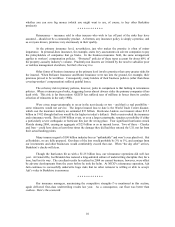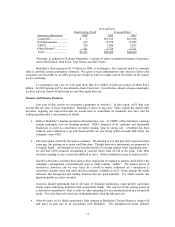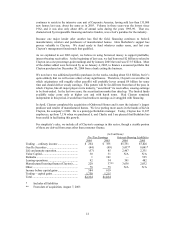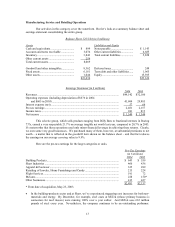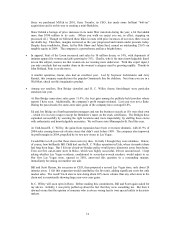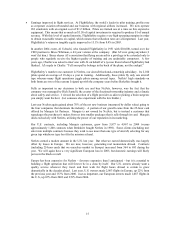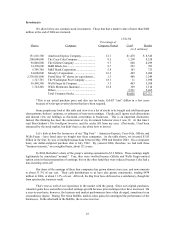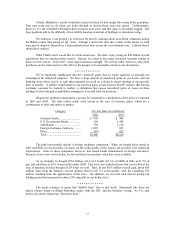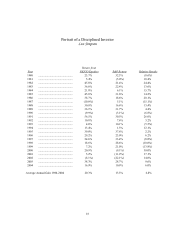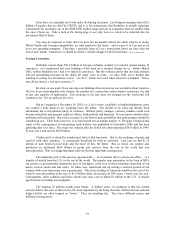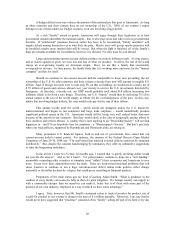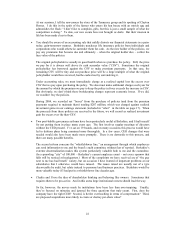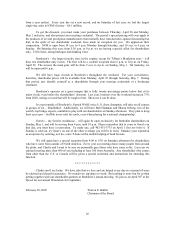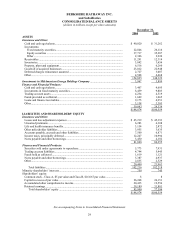Berkshire Hathaway 2004 Annual Report Download - page 21
Download and view the complete annual report
Please find page 21 of the 2004 Berkshire Hathaway annual report below. You can navigate through the pages in the report by either clicking on the pages listed below, or by using the keyword search tool below to find specific information within the annual report. A budget deficit in no way reduces the portion of the national pie that goes to Americans. As long
as other countries and their citizens have no net ownership of the U.S., 100% of our country’ s output
belongs to our citizens under any budget scenario, even one involving a huge deficit.
As a rich “family” awash in goods, Americans will argue through their legislators as to how
government should redistribute the national output – that is who pays taxes and who receives governmental
benefits. If “entitlement” promises from an earlier day have to be reexamined, “family members” will
angrily debate among themselves as to who feels the pain. Maybe taxes will go up; maybe promises will
be modified; maybe more internal debt will be issued. But when the fight is finished, all of the family’ s
huge pie remains available for its members, however it is divided. No slice must be sent abroad.
Large and persisting current account deficits produce an entirely different result. As time passes,
and as claims against us grow, we own less and less of what we produce. In effect, the rest of the world
enjoys an ever-growing royalty on American output. Here, we are like a family that consistently
overspends its income. As time passes, the family finds that it is working more and more for the “finance
company” and less for itself.
Should we continue to run current account deficits comparable to those now prevailing, the net
ownership of the U.S. by other countries and their citizens a decade from now will amount to roughly $11
trillion. And, if foreign investors were to earn only 5% on that net holding, we would need to send a net of
$.55 trillion of goods and services abroad every year merely to service the U.S. investments then held by
foreigners. At that date, a decade out, our GDP would probably total about $18 trillion (assuming low
inflation, which is far from a sure thing). Therefore, our U.S. “family” would then be delivering 3% of its
annual output to the rest of the world simply as tribute for the overindulgences of the past. In this case,
unlike that involving budget deficits, the sons would truly pay for the sins of their fathers.
This annual royalty paid the world – which would not disappear unless the U.S. massively
underconsumed and began to run consistent and large trade surpluses – would undoubtedly produce
significant political unrest in the U.S. Americans would still be living very well, indeed better than now
because of the growth in our economy. But they would chafe at the idea of perpetually paying tribute to
their creditors and owners abroad. A country that is now aspiring to an “Ownership Society” will not find
happiness in – and I’ ll use hyperbole here for emphasis – a “Sharecropper’ s Society.” But that’ s precisely
where our trade policies, supported by Republicans and Democrats alike, are taking us.
Many prominent U.S. financial figures, both in and out of government, have stated that our
current-account deficits cannot persist. For instance, the minutes of the Federal Reserve Open Market
Committee of June 29-30, 2004 say: “The staff noted that outsized external deficits could not be sustained
indefinitely.” But, despite the constant handwringing by luminaries, they offer no substantive suggestions
to tame the burgeoning imbalance.
In the article I wrote for Fortune 16 months ago, I warned that “a gently declining dollar would
not provide the answer.” And so far it hasn’ t. Yet policymakers continue to hope for a “soft landing,”
meanwhile counseling other countries to stimulate (read “inflate”) their economies and Americans to save
more. In my view these admonitions miss the mark: There are deep-rooted structural problems that will
cause America to continue to run a huge current-account deficit unless trade policies either change
materially or the dollar declines by a degree that could prove unsettling to financial markets.
Proponents of the trade status quo are fond of quoting Adam Smith: “What is prudence in the
conduct of every family can scarce be folly in that of a great kingdom. If a foreign country can supply us
with a commodity cheaper than we ourselves can make it, better buy it of them with some part of the
produce of our own industry, employed in a way in which we have some advantage.”
I agree. Note, however, that Mr. Smith’ s statement refers to trade of product for product, not of
wealth for product as our country is doing to the tune of $.6 trillion annually. Moreover, I am sure that he
would never have suggested that “prudence” consisted of his “family” selling off part of its farm every day
20


